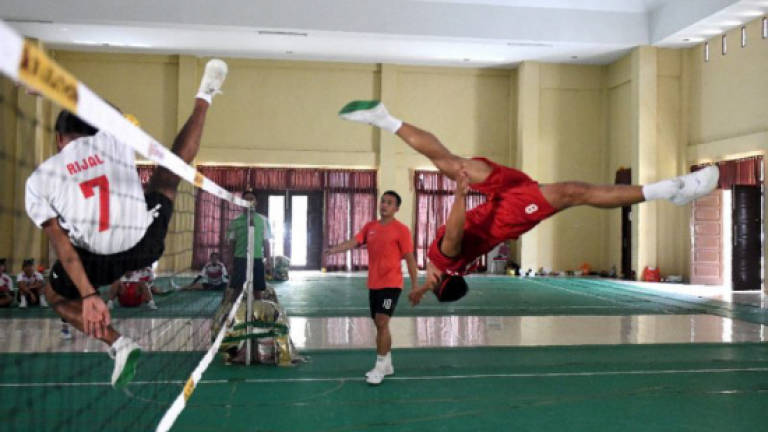Indonesia turns to police boot camp for sporting glory

JAMBI: A police boot camp complete with shooting lessons may not seem like a natural training ground for sportsmanship, but Indonesia's sepak takraw team is hoping that military-style discipline will help them achieve sporting glory.
The peculiar sport, which combines elements of football and volleyball, is native to Southeast Asia but the region's biggest country has long lagged behind its smaller neighbours in the battle for dominance.
Now the country's top players have taken the unusual step of "embedding" with an elite police unit on Sumatra island, where a crack team of officers are helping the 15 male and female athletes get into shape by overseeing exercise sessions.
"This is the perfect place for them to train," Indonesian sepak takraw chief Asnawi Rahman said about the decision to send the team to Jambi in mid-March, ahead of the Southeast Asian Games in August.
"They can get mentally and physically prepared," he said.
The players are training with the Mobile Brigade, the police's special operations unit which is involved in counter-terrorism and riot control.
While the officers can offer little in the way of sepak takraw expertise, the team can pick up skills such as firing weapons, which the experts in the game believe helps to focus the players' minds.
Centuries-old sport
The centuries-old sport was originally played with a grapefruit-sized ball fashioned from straps of rattan with 12 holes.
It was traditionally played with two teams of three facing each other on a court about the same size as a badminton court, with a raised net. Players kick and head the ball over the net, but aren't allowed to touch it with their hands or arms.
Nowadays a synthetic fibre ball has replaced the old type – although they still have the trademark multiple holes – and the sport has developed a range of categories with different sizes of teams.
These range from teams of just two players to teams of up to four. There will be several different categories at the forthcoming Southeast Asian Games in Kuala Lumpur, and Indonesia will compete in three.
But the country faces an uphill struggle.
In recent years Thailand – where sepak takraw has a bigger following than in Indonesia – has dominated the sport at regional tournaments, while Myanmar has also been gaining ground after investing money in training and development.
Rahman says the government needs to do more to support sepak takraw by increasing funding for equipment, uniforms, and venues. He believes they should pay more to coaches to help groom future stars.
He warns the country has fallen behind because their players are not as well prepared physically and mentally as their rivals, and hopes the police training will make a difference.
Rahman chose Jambi, his hometown, as the location as it is quiet and has few distractions.
But the arrangement involves significant personal sacrifice for the players, who are forced to live a hermit-like existence for the five months they are at the base.
They are not allowed to leave the compound – which is closed to members of the public – at all on weekdays and are only allowed out at weekends accompanied by officers.
'Highly motivated'
Still, the players think it's worth it.
"I like it here, more than training at previous places," said Dini Mitasari, a 23-year-old female player who is also an army officer.
"Mobile Brigade officers are highly disciplined, and they're also highly motivated – it affects us and our motivation as well."
After the Southeast Asian Games, the players face an even bigger challenge at the Asian Games in 2018.
They will be playing on home turf, driving up pressure to put on a good performance.
For now though, the officers hoping to get them to the winners podium are simply happy to have played their part, regardless of the eventual outcome.
We are very proud and honoured that we can help our national athletes," said Yuri Karsono, the Jambi unit's deputy chief. — AFP